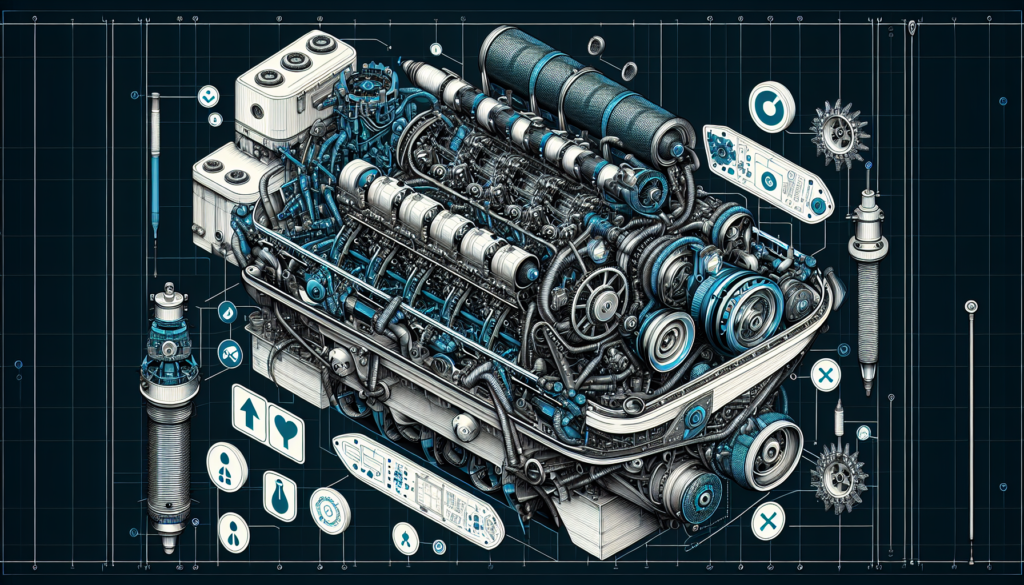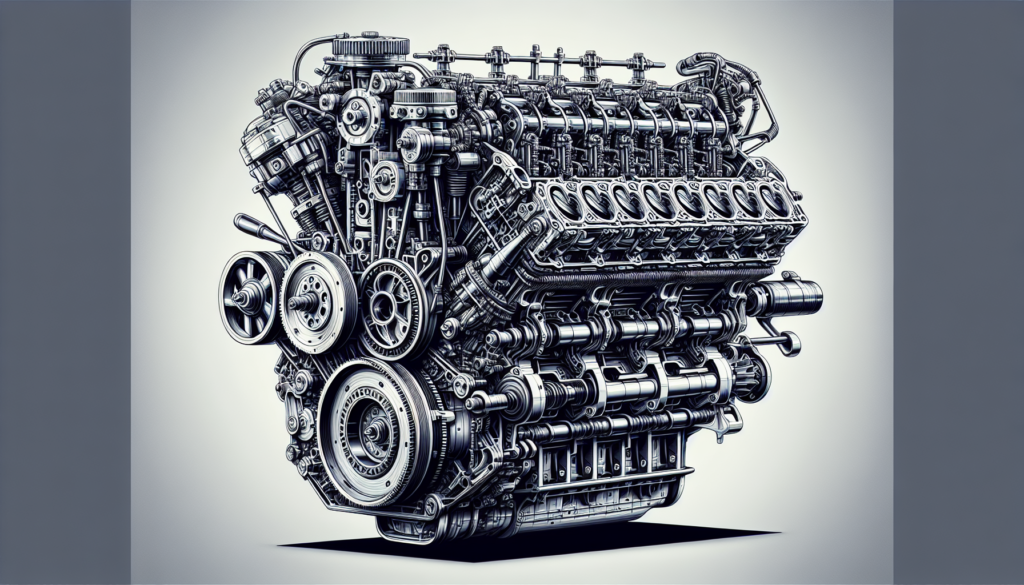You’re out on the water, the sun is shining, and suddenly, your boat engine stalls. You can feel the frustration mounting. But, don’t let engine troubles ruin your perfect day at sea! “Best Ways to Troubleshoot Boat Engine Issues” is a hands-on guide that will arm you with the necessary knowledge to diagnose and rectify common boat engine problems. This comprehensive article will let you in on valuable tips, advice, and step-by-step procedures to make sure your sea vessel remains afloat and your trips smooth sailing.

Understanding Basic Boat Engine Components
Just like a car, a boat engine has many different components that work together to keep it running smoothly. When things go wrong, understanding these pieces can help pinpoint the issue.
Engine block
At the heart of the engine is the engine block, often referred to as the ‘block’. This is made of heavy-duty metal and contains the cylinders and other key components of the engine. It’s important to maintain the block as damage here can result in major engine failure.
Cylinder head
The cylinder head plays a key role in the combustion process. Mounted on top of the engine block, it seals the top of the cylinders, forming the combustion chamber. This is where fuel and air mix and ignite to drive the pistons.
Timing system
Ensuring every component of your engine works in synchrony, the timing system controls the sequence of fuel intake, compression, combustion, and exhaust operations in the engine’s cylinders.
Ignition system
The ignition system is what sparks off the process of combustion in your engine. It sends a high voltage current to the spark plugs, causing them to ignite the air-fuel mix in the engine’s cylinders.
Fuel system
Lastly, your boat’s fuel system transports fuel from the tank to the engine. Keeping this system clean and well-maintained is vital to ensure proper engine operation and fuel efficiency.
Familiarizing Yourself with Common Boat Engine Problems
Just like any mechanical device, boat engines can suffer from various issues. Here are some common ones that you might encounter.
Engine won’t start
One of the most frustrating moments is when you’re all set for a day on the water, but the engine just won’t start. This can be due to a range of issues, from a faulty ignition system to an empty fuel tank.
Engine overheating
Overheating can be a common problem, especially in high-performance engines. This can be due to a failing cooling system, blockage in the water passages, or a faulty thermostat.
Engine stalling or misfiring
If your engine stalls or misfires, it means that the combustion process is not working correctly. This could be caused by issues with the spark plugs, timing system, or fuel delivery.
Loss of power or poor fuel economy
A sudden loss of power or poor fuel economy can be a sign that something is wrong with your boat’s engine. This might be due to problems with the fuel system, a dirty air filter, or worn-out spark plugs.
Preventing Boat Engine Problems
Just like with any other vehicle, regular maintenance is the key to preventing boat engine problems.
Regular engine maintenance
A well-maintained engine is less likely to encounter problems. Regular oil changes, spark plug replacements, and comprehensive inspections can help catch minor issues before they become major problems.
Proper fuel storage
Improper fuel storage can lead to a variety of issues, including engine damage. It’s important to store fuel properly, and also to use fresh fuel whenever possible.
Boat winterization
Protect your boat in the colder seasons through proper winterization. This involves draining the fuel, lubricating the engine and moving parts, and properly storing the boat.
Proper ventilation
A well-ventilated engine bay helps reduce heat and moisture build-up. This can prevent overheating, corrosion, and other issues that can lead to engine damage.

Troubleshooting a Boat Engine That Won’t Start
There are several processes you can follow to find out why your engine won’t start. Here are some tips to help identify the problem.
Check for fuel delivery issues
First things first – verify whether fuel is reaching the engine. If not, there might be a leak, blockage, or other issue in the fuel system.
Inspect the ignition system
No spark could be why your engine refuses to start. Inspect the ignition system, including the ignition switch, starter motor, and spark plugs.
Test the starting circuit
Check the boat’s starting circuit to ensure it’s working correctly. Faulty wiring or connections could be hindering the engine from starting.
Assess the battery condition
Your battery might be flat or failing, which can stop the engine from starting. Test the battery’s voltage with a multimeter to ensure it’s operating correctly.
Addressing Boat Engine Overheating Problems
If the boat engine is overheating, it needs to be addressed immediately to prevent permanent damage. Below are steps to troubleshoot this issue.
Inspect the cooling system
Check the boat’s cooling system. If it’s not functioning properly, the engine can overheat due to lack of proper cooling.
Look for blockages
Ensuring there are no physical blockages in the engine’s water passages can prevent overheating. Over time, salt, mud, and general debris can clog these passages.
Check the water pump
The water pump sends cool water to the engine. Make sure it’s working correctly and isn’t clogged or damaged.
Examine the thermostat
Check on the thermostat’s status. If it doesn’t open as it should, hot water can’t escape, leading to overheating.
Rectifying Engine Stalling or Misfiring
Engine stalling or misfiring can be concerning. Here’s how to troubleshoot these issues.
Check the spark plugs
First, inspect the spark plugs. Misfiring can occur if they’re worn out, dirty, or improperly gapped.
Inspect the fuel system
Ensure that fuel is flowing to the engine without hindrance. Any blockages or leaks can cause the engine to stall or misfire.
Check the ignition system
Problems with the ignition system, such as a weak spark or faulty wiring, can disrupt the combustion process and cause stalling or misfiring.
Examine the timing system
Verify if the timing system is working properly. If not, it can cause the engine’s operations to be out of sync, leading to stalling or misfiring.
Solving Loss of Power or Poor Fuel Economy
Loss of power or poor fuel economy can hinder your boating experience. Let’s look at how we can resolve these issues.
Check the fuel system
Inspect the fuel system for any obstructions, leaks, or damage. They can cause poor fuel economy and power loss.
Inspect the air filter
A dirty air filter can limit the amount of airflow to the engine, causing poor performance and higher fuel consumption.
Test the spark plugs
Ensure your spark plugs are in good condition. A dirty or damaged plug can reduce engine power and efficiency.
Evaluate the exhaust system
A restricted exhaust system can lead to loss of power. Make sure the exhaust isn’t clogged and the muffler isn’t damaged.
When to Seek Professional Help
There will be times when it’s best to leave the troubleshooting to the professionals.
Persistent problems
If you’re dealing with an ongoing problem that you can’t figure out, it’s best to consult a professional. They have the knowledge and tools to diagnose and fix even the most complicated issues.
Lack of experience or comfort with boat engines
If you’re not comfortable doing the work yourself or lack the necessary experience, don’t hesitate to seek professional help. Missteps can lead to further damage and costlier repairs in the long run.
Potential internal engine damage
Any issue that potentially involves internal engine damage should be dealt with by a professional. This is a complicated area that requires specialized knowledge and tools.
Safety considerations
Working on a boat engine can be risky. If a job seems dangerous or you are unsure, it’s best to leave it to the professionals.
Strike Up a Maintenance Schedule
When it comes to boat maintenance, consistency is key. A regular maintenance schedule can help keep your boat running smoothly and reduce the likelihood of major repairs.
Routine inspections
Get into the habit of performing routine inspections of your boat. These can help identify potential problems early and keep you on top of your boat’s condition.
Oil and filter changes
Regular oil and filter changes are an essential part of boat maintenance. They ensure your engine stays clean and runs smoothly.
Winterizing your boat
During the colder months, winterizing your boat can prevent damage. This involves draining the fuel, lubricating the engine and moving parts, and storing it correctly.
Summer preparations
Just as you prepare your boat for winter, it’s vital to prepare it for summer too. This might include cleaning, checking the cooling system, and making sure it’s ready for the warmer temperatures.
Educational Resources for Boat Engine Troubleshooting
Understanding your boat’s engine can be a complex task, but there are various educational resources available to help.
Boat engine repair manuals
These manuals often come with your boat and provide detailed information about its engine, including troubleshooting guides.
Online communities and forums
There are plenty of online communities and forums where boat owners share their knowledge and experiences. These can be invaluable resources when you’re stuck on a problem.
Boat repair classes and workshops
Plenty of organizations offer boat repair classes and workshops. These can help you learn more about boat maintenance and repair in a hands-on environment.
Consultation with marine mechanics
Never underestimate the value of a seasoned marine mechanic. Their wealth of knowledge and expertise can provide you with insights into maintaining and troubleshooting your boat’s engine.


[…] of understanding your boat engine is recognizing when there’s a problem. Common engine problems can range from overheating, […]